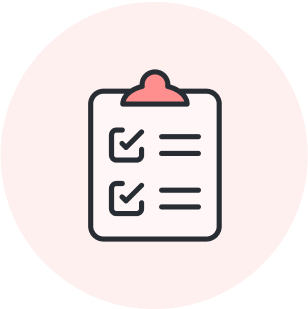
How to create a question-based agenda
Reading time: about 6 min
It’s a familiar story. You come to a meeting armed with a clear agenda and every intention to follow it to a T. But somehow the meeting still lacks focus and engagement. You name a topic of discussion, open the floor, and...crickets.
By the end of the meeting, maybe you’re left with a handful of assignments but no real sense of accomplishment. The group leaves feeling drained and bored. You tick off the meeting from your to-do list feeling tired and defeated. Then you do it all over again next week.
If this hits close to home, you’re not alone. The majority of professionals spend at least a third of their time in meetings each week—and those may just prevent you from completing your work. Wasted time in meetings is not only costly, it can lead to frustration and burnout among your team.
But it doesn’t have to be this way.
Meetings are often necessary to drive collaboration, build consensus around decisions, and solve problems. And in today’s increasingly remote-based work environment, meetings are simply a fact of professional life. So how do you make sure your meetings are productive and engaging?
Rethink your agendas.
Use the following tips to transform your meetings with question-based agendas that drive purpose, engagement, and decision-making in your organization.
What is a question-based agenda?
Most agendas follow a predictable outline that lists out topics of discussion or steps to take such as, “Introduction,” “Open discussion about X,” or “Action items.” While this format can give some structure to your meeting, it’s ultimately problematic because it puts the burden on the facilitator to “run” the meeting.
The job of the facilitator, however, isn’t to run a meeting. Instead, they simply need to create the space for the team to obtain their meeting goals.
That’s where question-based agendas come in.
A question-based agenda replaces those traditional agenda topic headers with specific questions to spark thoughtful conversation. Questions are an effective way to engage attendees in the discussion. The best questions elicit collaborative brainstorming and actionable solutions while building consensus in the decision-making process.
How to create a question-based agenda
To create a question-based agenda, the facilitator identifies the purpose of the meeting (i.e., the end goal or outcome you want to achieve) and works backward from there to craft questions that will drive the discussion in that direction.
Understanding the purpose of each meeting topic you want to cover is the key to creating an effective question-based agenda. If your meeting is to discuss a project’s progress, consider exactly what metrics or problems you want to know about.
For example:
-
Where are we on the project timeline?
-
What roadblocks are you coming up against?
-
What support or resources do you need to ensure timely progress?
Typically, the more specific your questions are, the better. This will keep the discussion focused, clear, and productive
How question-based agendas improve meetings
Can changing your agenda approach really make that much of a difference in your meetings? We think so. Here are just a few benefits of adopting a question-based agenda to guide your meetings.
Promote creative problem solving
Broad discussion topics don’t immediately spark thoughtful discussion. They’re too general and don’t get at the specific purpose you want to focus on. For instance, if you see “Year in review” on an agenda, where would you focus your attention? How would you review the year?
Reframing the topic as a question (or questions) helps you drill down to the purpose of the review. For example, instead of “Year in review” you might ask, “How can we improve our sales process for better customer satisfaction in the coming year?”
See the difference? A question forces participants to engage with the topic and think critically about a problem or goal. In other words, questions spark curiosity, drive home the real purpose of the meeting, and narrow the focus of the conversation to what really matters.
Empower participants to take ownership
One of the most important reasons to follow a question-based agenda is to help participants take ownership of the meeting. Questions reinforce that the facilitator is not the decision-maker or final say on the content or outcome of the meeting. Rather than running through a traditional agenda, delegating assignments, and checking off items, facilitators simply ask the questions to guide discussion and refocus the group if the conversation goes off track.
This creates an environment where everyone is encouraged to participate. Instead of deferring to a team leader or meeting head, each person attending the meeting should be invested in the conversation and contribute to the final action items. This approach promotes collaboration and consensus in the decision-making process.
Provide a meeting roadmap
Broad discussion topics aren’t specific enough to really guide a meeting. For instance, if you have an agenda item like “Budget review,” that doesn’t tell you the purpose of the review, what issues you want to discuss or resolve, or when you will know you’ve covered the topic appropriately.
That’s another reason framing your agenda items as questions is valuable—questions act as route markers for the meeting participants. The agenda questions help you understand where you are in the meeting, as well as when you are done.
For example, instead of “Budget review,” you could reframe the agenda item as a question like, “How can we maximize our employee benefits investment next year?” or “How can we reduce manufacturing costs by 20% in two years?” Specific questions like these clarify exactly what solutions you’re looking for and leave the floor open to innovative discussion and creative problem solving. By the end of the meeting, you should have a pretty good idea of how well you answered the questions and have clear takeaways to act on.
Encourage flexibility
Question-based agendas also allow for more flexibility than traditional agendas and more space for participants to raise questions, discuss possibilities, and introduce helpful additions to the agenda.
This is because questions open up the floor to group discussion. While the discussion is purpose-driven by a specific question, the door remains open to flexible, creative thinking and problem solving.
Reinforce the facilitator role
Too often, meetings are directed by a leader (often a manager, executive, or project owner) rather than guided by a facilitator.
“What’s the difference?” you may ask. The main difference is that a leader runs the meeting as the head of the group or the primary decision-maker. They typically move through the list of agenda items, may end up speaking the majority of the time, and essentially create a hierarchical dynamic to the meeting that stifles open discussion and innovative thinking.
In contrast, a facilitator is typically a neutral player in the group (i.e., not a manager) and acts as a collaborative leader in service to the participants. The benefit of a facilitator-led meeting is that the group is empowered to contribute more equally to solving problems, raising questions, and finalizing decisions.
A question-based agenda reinforces the facilitator’s role and helps the facilitator guide the meeting effectively.
Getting to the meat of a meeting isn’t always easy. But following a question-based agenda can make the experience a little less painful and a lot more useful. If your meetings aren’t meeting expectations, try a different tactic. Work with your facilitator to draft good questions and see where the agenda takes you. You might be surprised at the results.

Ready to get started? Set up your own question-based meeting agenda using these tips in Lucidspark.
Go nowAbout Lucidspark
Lucidspark, a cloud-based virtual whiteboard, is a core component of Lucid Software's Visual Collaboration Suite. This cutting-edge digital canvas brings teams together to brainstorm, collaborate, and consolidate collective thinking into actionable next steps—all in real time. Lucid is proud to serve top businesses around the world, including customers such as Google, GE, and NBC Universal, and 99% of the Fortune 500. Lucid partners with industry leaders, including Google, Atlassian, and Microsoft. Since its founding, Lucid has received numerous awards for its products, business, and workplace culture. For more information, visit lucidspark.com.
Related articles
How to create an effective meeting agenda [+ templates]
In this blog post, we will identify ways to create more effective meeting agenda, and some templates to get you started.
Your go-to meeting facilitation toolkit
In this blog post, we will summarize our webinar with Marsha Acker, CEO of Team Catapult, on the benefits of effective facilitation and ways that facilitators can improve their skills.
Tips for using virtual whiteboards during meetings
In this article, you will learn helpful tips for using virtual whiteboards to improve your virtual meetings.
How to stop running meetings and start facilitating them
In this article, we’ll dig into the difference between running a meeting and facilitating a meeting. We even cover the best practices to drive productive meetings.
